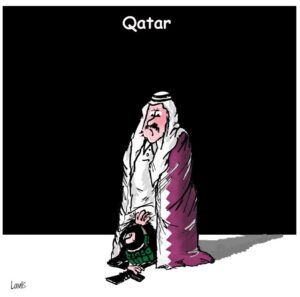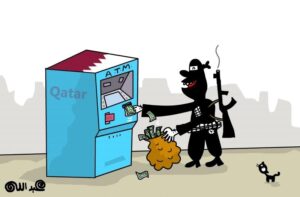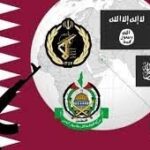Analyzing Qatar’s association with illicit financing of terrorism, this paper highlights the concerning proximity between Qatar and terror financiers. It underscores the presence of a permissive legal framework within Qatar, allowing financiers to operate in the state with relative ease. Furthermore, the historical connections between Qatar and channels for illicit funds raise questions about the nation’s commitment to combating terrorism. The ramifications of Qatar’s alleged relationship with terrorism financing are noted, particularly concerning the 2017 Gulf crisis, which disrupted regional stability. Additionally, this paper emphasizes shifts in U.S. foreign policy towards the Gulf region in response to these concerns. The paper concludes by providing policy recommendations for the U.S. government, aimed at fostering cooperation while simultaneously mitigating the risks of alienation and regional instability.
U.S.-Qatar Relations: The Dilemma of Alleged Terror Support
Qatar’s alleged support for regional terrorist networks, including the Muslim Brotherhood, has posed a persistent challenge to U.S.-Gulf relations. The United States’ relationship with Qatar regarding illicit terror support is intricate and marked by conflicting perspectives. While some U.S. agencies have advocated for cooperation with Qatar, others have raised concerns about what they describe as Qatar’s “permissive jurisdiction.” This permissiveness is believed to have enabled operatives to funnel illicit funds to terrorist Organizations, a fact that raises significant questions about the nation’s commitment to combating terrorism and regional stability.


Delving into the accusations leveled against Qatar and the United States’ response is crucial for gaining insight into bilateral relations and shaping the trajectory of future U.S. foreign policy towards Qatar. Qatar has faced allegations of not only offering refuge to terrorism financiers but also of directly funding terrorist groups. These claims are difficult to substantiate due to the covert nature of financial operations tracked by the Qatari government. While think tank analyses, news reports, and publicized findings by U.S. agencies
shed some light on the matter, a lack of transparency obscures Qatar’s financial links to terrorism. Nonetheless, Qatar’s role can be examined using a multitude of sources, including State and Treasury Department records on terrorist convictions, frozen funds, and potential cooperation with the U.S. government, as well as existing international laws governing terrorism financing and support. Adding to the complexity of the issue, a coalition of states known as the Anti-Terror Quartet (ATQ), comprising Saudi Arabia, Egypt, the UAE, and Bahrain, presented Qatar with a list of individuals and entities they sought to have sanctioned for their involvement in terrorist activities or financing. The list identified fifty-nine individuals from various nationalities under Qatar’s jurisdiction, whom they believed played key roles in regional terrorist networks. This further underscores the concerns and questions regarding Qatar’s stance in the fight against terrorism and its relationships with potentially illicit actors.
Examining Qatar’s Alleged Terror Links and the U.S. Response
The connection between Qatar and terrorist financiers, particularly in relation to various regional terrorist organizations, has been a subject of concern since the post-9/11 era. It has been observed that the Qatari state provided financial support to several terrorist organizations in 2001, including Ahrar al-Sham, a Syrian Jihadist group, the Hamas branch of the Muslim Brotherhood, and the Ennahda party. Moreover, beyond financial assistance, Qatar has been linked to the provision of weapons to groups like Libyan Dawn in 2014 and the Muslim Brotherhood in Egypt. Additionally, funding for weapon surges has reportedly been made available in West African countries such as Mali. These patterns of support are well-known in Washington policy circles, raising questions and concerns about Qatar’s role in connection to terrorist financiers.
The Ongoing Challenge of Terror Financing
The enduring issue of terror financing has put significant strain on the relatively strong bilateral relationship that Washington cultivated with Qatar after the 1991 Gulf War. While recent events have been attributed to the Emir of Qatar’s alleged inflammatory remarks and Doha’s reported ransom payment to Iran-backed extremists, the roots of this dispute are undeniably more complex. These ongoing challenges surrounding terror financing have added an additional layer of tension to an already sensitive diplomatic relationship.


Qatar’s Associations with Terror: Straining Gulf Relations
While the Gulf conflict cannot be solely attributed to Qatar’s alleged terrorist financing, a significant part of the public rationale behind the rift has indeed revolved around Qatar’s associations with terror and its perceived reluctance to publicly condemn terrorist groups, such as Hamas. These concerns have contributed to the strained relations with neighboring countries and have been a focal point of contention.
Navigating Qatar’s Terror Financing Allegations for Regional Stability
In conclusion, the allegations surrounding Qatar’s involvement in terror financing have been a long-standing source of tension in the Gulf region and have strained diplomatic relations, particularly with the United States and its neighboring countries. The complexities of this issue, the lack of transparency in financial operations, and the continued concerns regarding Qatar’s associations with terrorist networks have led to a challenging and delicate situation. The 2017 Gulf crisis and shifts in U.S. foreign policy towards the Gulf are indicators of the far-reaching consequences of these allegations. As the situation evolves, the need for open dialogue, cooperation, and a commitment to counterterrorism efforts remains paramount in addressing these concerns and ensuring regional stability.


